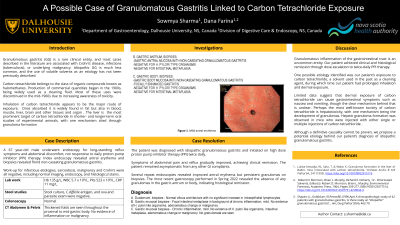Back

Poster Session C - Monday Afternoon
Category: Stomach
C0726 - A Possible Case of Granulomatous Gastritis Linked to Carbon Tetrachloride Exposure
Monday, October 24, 2022
3:00 PM – 5:00 PM ET
Location: Crown Ballroom

- SS
Sowmya Sharma, MD
Johns Hopkins Hospital
Baltimore, MD
Presenting Author(s)
Sowmya Sharma, MD1, Dana M. Farina, MD2
1Johns Hopkins Hospital, Baltimore, MD; 2Dalhousie University, Halifax, NS, Canada
Introduction: Granulomatous gastritis (GG) is a rare clinical entity, and most cases described in the literature are associated with Crohn’s disease, infections, or underlying malignancy. Idiopathic GG is much less common, and the use of volatile solvents as an etiology has not been previously described. We present a possible case of granulomatous gastritis linked to occupational exposure to carbon tetrachloride.
Case Description/Methods: A 67 year-old male underwent endoscopy for long-standing reflux symptoms and abdominal discomfort, not responsive to daily proton pump inhibitor (PPI) therapy. Index endoscopy revealed antral erythema and biopsies revealed florid non-caseating granulomatous gastritis. Work-up for infectious etiologies, sarcoidosis and Crohn’s all returned back negative, including normal imaging, endoscopy, and histological stains. The patient was diagnosed with idiopathic granulomatous gastritis. Multiple repeat upper endoscopies with biopsy showed persistent GG in the absence of infections. Occupational exposure to carbon tetrachloride was identified in the patient’s history, with frequent use over a one-year period while working on an industrial ship. Carbon tetrachloride has been demonstrated in the literature to cause hepatic toxicity, with one mechanism being through granuloma formation.
Discussion: Our patient achieved symptom control through dose escalation to twice-daily PPI therapy. One possible etiology identified was this patient’s exposure to carbon tetrachloride, a solvent used in the past as a cleaning agent, which is how our patient had his prolonged exposure. Limited data suggest that dermal exposure of carbon tetrachloride can cause gastrointestinal symptoms such as nausea and vomiting, though the clear mechanism behind that is unclear. Perhaps the most well-known toxicity of carbon tetrachloride is hepatotoxicity, with one mechanism being granuloma formation seen in studies of mice who were injected with the substance. Although a definitive causality cannot be proven, we propose a potential etiology behind our patient’s diagnosis of granulomatous gastritis.
Disclosures:
Sowmya Sharma, MD1, Dana M. Farina, MD2. C0726 - A Possible Case of Granulomatous Gastritis Linked to Carbon Tetrachloride Exposure, ACG 2022 Annual Scientific Meeting Abstracts. Charlotte, NC: American College of Gastroenterology.
1Johns Hopkins Hospital, Baltimore, MD; 2Dalhousie University, Halifax, NS, Canada
Introduction: Granulomatous gastritis (GG) is a rare clinical entity, and most cases described in the literature are associated with Crohn’s disease, infections, or underlying malignancy. Idiopathic GG is much less common, and the use of volatile solvents as an etiology has not been previously described. We present a possible case of granulomatous gastritis linked to occupational exposure to carbon tetrachloride.
Case Description/Methods: A 67 year-old male underwent endoscopy for long-standing reflux symptoms and abdominal discomfort, not responsive to daily proton pump inhibitor (PPI) therapy. Index endoscopy revealed antral erythema and biopsies revealed florid non-caseating granulomatous gastritis. Work-up for infectious etiologies, sarcoidosis and Crohn’s all returned back negative, including normal imaging, endoscopy, and histological stains. The patient was diagnosed with idiopathic granulomatous gastritis. Multiple repeat upper endoscopies with biopsy showed persistent GG in the absence of infections. Occupational exposure to carbon tetrachloride was identified in the patient’s history, with frequent use over a one-year period while working on an industrial ship. Carbon tetrachloride has been demonstrated in the literature to cause hepatic toxicity, with one mechanism being through granuloma formation.
Discussion: Our patient achieved symptom control through dose escalation to twice-daily PPI therapy. One possible etiology identified was this patient’s exposure to carbon tetrachloride, a solvent used in the past as a cleaning agent, which is how our patient had his prolonged exposure. Limited data suggest that dermal exposure of carbon tetrachloride can cause gastrointestinal symptoms such as nausea and vomiting, though the clear mechanism behind that is unclear. Perhaps the most well-known toxicity of carbon tetrachloride is hepatotoxicity, with one mechanism being granuloma formation seen in studies of mice who were injected with the substance. Although a definitive causality cannot be proven, we propose a potential etiology behind our patient’s diagnosis of granulomatous gastritis.
Disclosures:
Sowmya Sharma indicated no relevant financial relationships.
Dana Farina indicated no relevant financial relationships.
Sowmya Sharma, MD1, Dana M. Farina, MD2. C0726 - A Possible Case of Granulomatous Gastritis Linked to Carbon Tetrachloride Exposure, ACG 2022 Annual Scientific Meeting Abstracts. Charlotte, NC: American College of Gastroenterology.
